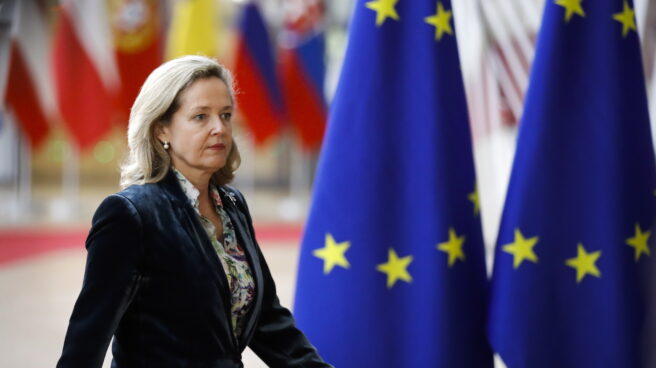

Spanish First Vice President and Minister of Economy Nadia Calvino at the opening of the meeting of Eurogroup Finance Ministers in Brussels
The ministers of economy and finance of the Eurozone (Eurogroup) gave this Monday free bars phase of government spending is over which began with the suspension of government deficit and debt-limiting rules in March 2020 with the onset of the pandemic, and which continued as a result of the war in Ukraine.
The joint statement of the twenty countries of the single currency notes that, despite the “uncertainty” created by “geopolitical and energy factors”, risks threatening economic growth “they seem more balanced than previously thought”, inflation is already declining, although it remains at “still high by historical standards”, and labor markets are “strongly” resisting.
“In the light of the economic outlook and in the context of high inflation and tightening financial conditions, we reiterate that a general fiscal stimulus to aggregate demand is not justified,” reads the text, in which eurozone finance headlines indicate that this year and thereafter they will adopt “prudent fiscal policy” aimed at ensuring debt sustainability over the medium term.
Therefore, the Eurogroup supports the message that the European Commission has embodied in its guidelines to prepare budgets for 2024, and also includes the idea of accompanying the new round of adjustments with investments and reforms that “boost potential growth” and allow the bloc to continue moving forward in the green and digital transition.
“We asked protect investments, especially strategicboth at national and European level. And we also call for a prudent fiscal policy with the removal of universal energy support measures,” concluded the commissioner for the economy, Paolo Gentiloni, upon arrival at the meeting.
In this regard, the Eurogroup points out that measures taken to combat rising energy prices are costly to public finances, and therefore it is necessary to move “from universal support to more targeted measures with better design and efficiency, and more affordable.
Consequently, and “in the absence of new price increases”, the G20 is committed to “continue to remove energy support measures”, which will help “reduce the state budget deficit”, as well as “continue to protect the most vulnerable households and viable businesses”.
Eurogroup statement on Budget policy for 2024 However, it does not make any reference to Brussels’ intention not to open excessive deficit files this year for countries whose public accounts gap exceeds 3% of GDP or whose debt exceeds 60% of GDP.
This was a point of contention before the debate at the Eurogroup meeting, as countries such as Germany and the Netherlands preferred to have these procedures open as early as this spring, which would mean the launch of a procedure for 16 of the 27 EU countries that would exceed 3%, according to latest forecasts of the Commission.
On the contrary, the Vice President and Minister of Economy of Spain, Nadia Calvino was against opening the files this year. as it “still appears to be a wholly extraordinary exercise due to the need to mobilize public resources” to respond to the effects of the war in Ukraine and contain inflation.
While Berlin advocates the need to reapply existing rules in 2024 unless new ones are agreed, Spain favors a “transitional regime” until the “twenty-seven” agrees to reform the Stability and Growth Pact in line with the position partners such as France or Belgium.
“Are the current rules adequate? No, because we all see that the situation has changed radically (…) New rules are needed, and the sooner we can change them, the safer the eurozone will be,” said French Finance Minister Bruno Le Maire.
Source: El Independiente